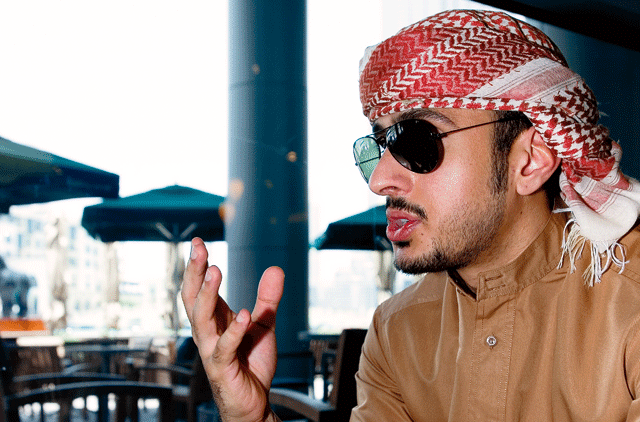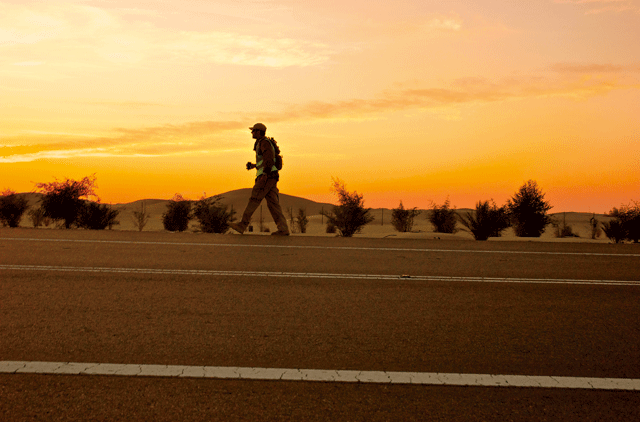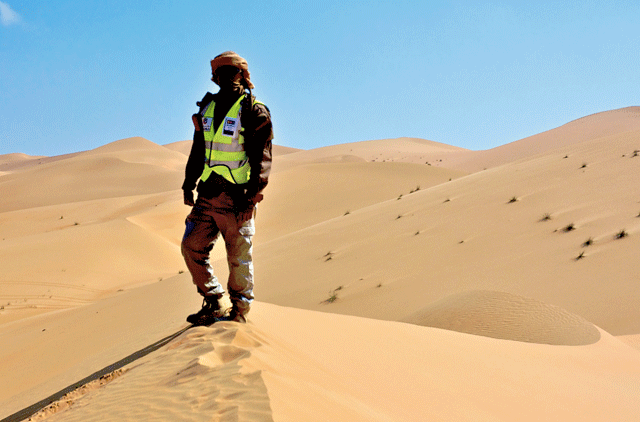
Looking up at the spectacular Burj Khalifa with unmitigated awe, the young Emirati's face lights up with pride as he extols its virtues. You could lead yourself to believe that his admiration is understandable. After all, the Burj Khalifa is an extraordinary symbol of this country's progress and vision. But the soft-spoken, quiet and unassuming young man's awe is an amalgam of pride in its beauty and belief in his mission. A mission he has underwritten for himself and which he hopes will make his countrymen realise the power of self-belief and determination - qualities that are the enduring threads of the fabric ofa progressive society.
Jalal Bin Thaneya's current obsession - which he has been nursing for some time now - is to climb to the top of the Burj Khalifa via the stairwell.
He estimates that this would be akin to covering a distance of about 5km, even though the structure externally appears to stretch almost 1km into the sky.
Thaneya's initial plan was to be the first to climb it during the inauguration of the tower in January this year, but that was not to be.
Bin Thaneya is now talking to Emaar about undertaking a major fundraiser next November, where he will lead many climbers, who will all be part of the challenge.
Bin Thaneya is no ordinary24-year-old. His quiet countenance and demeanour may well lead you to believe that he is a placid observer of his society and people, but get him to talk of his unarguably determined pursuits in life and his liquid brown eyes flash a clear message - he seesa different purpose to his life.
For a considerable time nowBin Thaneya - a slender, self-effacing young student who graduates from Middlesex University in Dubai this October - has been reaching out to sections of society to make a difference with his humanitarianism.
This is not the first mission that Bin Thaneya is undertaking to raise funds for children with special needs.
In January 2007, he decided to do something that had not been attempted before - he set off on a walk across the UAE. Covering 600km, he intended to raise funds for the Dubai Autism Centre.
The Walk, as he called it, started in Sweihan, north of Abu Dhabi, and ran via Al Ain, Fujairah, Ras Al Khaimah, Umm Al Quwain, Ajman, Sharjah, Dubai and then back to Abu Dhabi. He used the main roads as they provided a safer and more direct route. He walked for nine hours straight between 8am and 5pm, covering approximately 40km each day.
The mission was a success, not only in raising funds for the centre but in raising Bin Thaneya's self-confidence as well.
"I decided to become an attention-seeker in order to achieve something worthwhile," he says of his decision. "Each of my projects manages to garner plenty of attention, and this is helping to make a positive impact on the lives of the special-needs centres."
Once he realised the impacta single man's determination can make, he was convinced he was on to a higher purpose to his life. His various efforts to make societya better place have earned him a fan following of impressive proportions, thanks in no small part to his use of social networking sites such as Facebook and Twitter.
This fame, however, is paradoxical in nature because he is, by his own admission, a very shy person. While he prefers to let his work do the talking, in a world that is so irrevocably networked by technology, it doesn't hurt that the ends justify the means. Social media, he says, is an indispensable tool to spread information "and bring in help for the centres I support. To remain connected and make people aware, it was vital to use social networking."
And it is just as well, as left to himself and given his unassuming approach, he would probably not have managed to generate even half the awareness these wonders of 21st century communication have done.
Hundred at a time
Not one to rest on his laurels, Bin Thaneya decided to undertake another extreme project to raise funds for yet another institute dedicated to the care of special-needs children - the Towers 100 Project. This project, as the name suggests, required him to climb 100 skyscrapers around Dubai, to raise awareness and funds for the Rashid Paediatric Therapy Centre (RPTC). Starting on January 20, 2008 at the Emirates Towers in Dubai and ending on February 1, 2008 at the Dubai World Trade Centre, Bin Thaneya had taken around 90,000 steps and 2,775 floors in 12 days.
Bin Thaneya's inspiration this time came from watching several people outside his gymnasium at Emirates Towers participating in a vertical marathon. He began to wonder what it would be like to carry out the same project on a much larger scale.
"I started to imagine what would happen to a body that went through the same thing 100 times…" and despite his doctor advising him not to do it, he went right ahead and completed the mission.
"As human beings we need tobe able to change the lives of those less fortunate. I have no disabilityand am healthy, so why shouldn'tI use this privilege to undertake extreme challenges that could draw attention, and bring help to the plight of those who are not able to stand up for themselves?"
Walk the talk
The urge to contribute towards the benefit of the special-needs children continued to drive Bin Thaneya and in December 2009 he decided to walk to the Empty Quarter to raise funds for the Senses Centre. His route was from Dubai to Abu Dhabi, Hamim, Liwa then to the Empty Quarter (Robh Al Khali) and ending at Umm Al Husn.
The 550km journey, which took a fortnight to complete, brought home the contrast of his privileged life compared with the lifestyle of his ancestors who had to brave the elements armed with little else but their grit and spirit in order to survive.
The Empty Quarter accounts for one-fifth of the Arabian Peninsula and encompasses parts of Saudi Arabia, the UAE, Oman and Yemen. It is considered one of the most hostile terrains in the world. Covering some 60km daily on foot, and survivinga bout of food poisoning, even while negotiating the daunting Hameem Road, adjacent to Madinat Zayed off Abu Dhabi, Bin Thaneya says that this 200km stretch was the most treacherous one he encountered.
"There is absolutely nothing there, and even in winter the sun was burning my skin."
Disability is a state of mind
Why did a young man in his twenties, with plenty of typical attractions that are endemic to the pursuit of life, suddenly veer off the beaten track onto the road less travelled? Who or what inspired him to lend his youthful energies to community service and altruism? He attributes it to a combination of factors. His childhood, for instance, was not exactly easy. "I wasa kid with some learning problems and I had to be constantly on the move," he says. "From one school to the other, sometimes repeating a year here, other times moving to an Arabic language school, then to an English language one, even a co-education school at one time..."
The experiences left him shaken and as he grew up he realised his predicament as a child was not unique. University experience was only marginally different. And as the experiences gathered and becamea body of thought, he entered adulthood mulling over it. There was no one moment where he cleaved away to make a life-changing decision to reach out "to become the voice of the special-needs children" but he was heading there. "We need to be more accepting of special-needs children and do more to help them integrate better with the mainstream," he says.
One with self
His embarking on extreme challenges has been a necessary step in bringing about a mental and physical transformation of his own. Apart from the physical changes he has made in his lifestyle, he has experienced the mental fortitude that comes from pushing yourself into areas that are populated only by your own altruistic desires. "I used to be a chain smoker, an indoor kind of person and lived a rather unhealthy life. There was very little of the athlete in me, but today I go to the gym every day no matter how tired I may be. I cannot imagine going near a cigarette, I am not caffeine-addicted and I eat healthily. The protracted periods of enforced isolation from community, friends and family, when I go off on my projects, sometimes lasting weeks on end, have toughened me mentally."
It is the role of wilful recluse that he says is the most daunting challenge for an individual. "When you have no human company and are at the mercy of the elements, you begin to contemplate the greatness of the universe. You are so close to God's creations. You begin to wonder, ‘Is this how it must have been at the beginning of time, when the world, not unlike the Empty Quarter, must have been completely unpopulated?' You need to draw upon every reserve of strength you have to get there." And by pitting yourself against nature with transparent honesty, you realise, he says, that it is not your colour or your skin or nationality that helps you survive, but the basic purity of your purpose.
Battling the ghosts within
With these kind of projects, it is imperative Bin Thaneya takes his physical health and safety very seriously. Apart from an intensive diet and fitness regime he cannot afford to slacken even for a day. He also usually has a doctor who examines him at designated intervals on his arduous physical journeys.
Has he known fear? He chooses to answer that differently. "Fear of the unknown is what makes us nervous. I believe we simply need to live in the here and now and fight for what we believe in. While journeying to the Empty Quarter recently, I began thinking about the creation of time, because at one point it [the world] was like that. It was empty, there was nothing. If man is not careful he might be back in the Empty Quarter again. Being there strengthened my faith. There you see things no man can create. I've seen dunes so big, no man can create those red gigantic dunes, no matter how much you pay him. No one can create a desert animal. It was such a change from the city I had left behind. In the city, it is always a race to excellence, making more money... In the Empty Quarter, none of this matters."
He is clear on how his choices are shaping him. "When you do these things [extreme challenges and adventures] you have to grow up, you cannot remain the same. I tended to look at every step I climbed [during the Towers 100 Project] as an obstacle when I had to physically move some old mattress or garbage out of the way to move forward or when I had to confront stale cigarette smoke and dingy conditions as the air quality in those stairwells got really bad. I looked at it as a learning experience."
There is, he says, always some wisdom, some truth that you arrive at which stays with you after such an experience.
"So in a sense, each one my projects has been life changing," he explains.
Does he plan his challenges one at a time, or is there some grand plan he is working towards?
"There is always a plan," he says. "My plan is like a road. Each day is all about how we read the route. We cannot look too far ahead. As long as each project or extreme adventure gets its share of attention for the people I am trying to help, I will keep doing these projects, taking time off work when needed, even changing jobs if the people I work for cannot accommodate the causes that I am passionate about."
In the time he has made a name for himself for his unusual brand of altruism, he has been surprised but pleased by the number of people who have decided to emulate him.
He urges fellow Emiratis to "be persistent and be original. Try to make a difference in whichever way you believe in and you will find you make other people believe in it too," the inspirational young man says.
As he gears up to face his next challenge he realises that conquering the tallest building in the world will have him once again calling upon his survival spirit.
It's a call he makes not as a fervent plea, but in the way one would ask for something that is simply due you.
For details on Jalal Bin Thaneya and his projects, and to find out how you can help, log on to www.binthaneya.com




